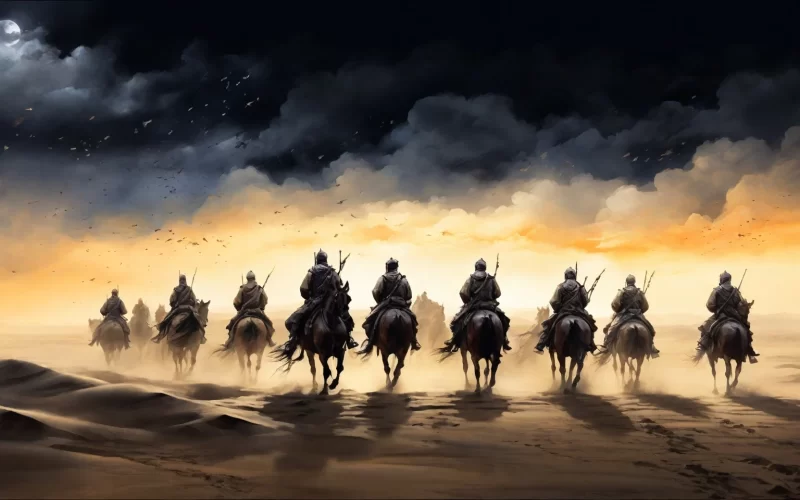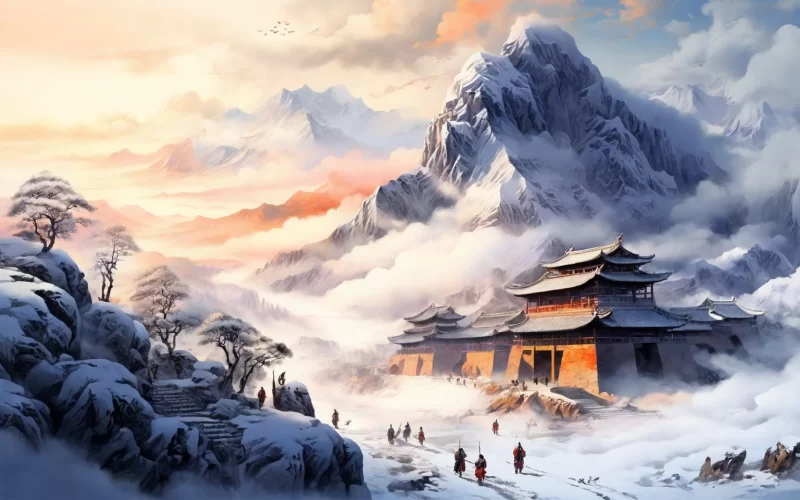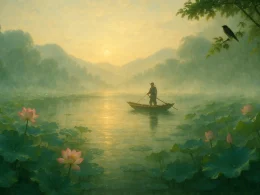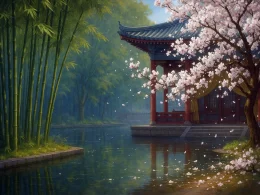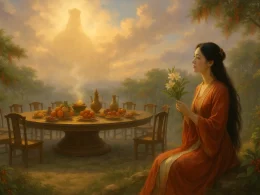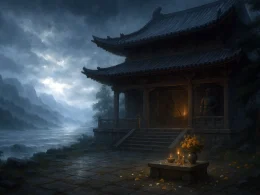The proud Tartar sons are hunting out of the town;
White grass spreads to the sky, wild fire bums up and down.
They ride on the desert when evening clouds hang low;
In autumn days on the vast plain they bend their bow.
Our officers strengthen the defense by daylight;
Our victorious generals cross the river at night.
The swords, bows and bridles mounted with gems and jade
Are awarded generals and their brave cavalcade.
Original Poem
「出塞作」
王维
居延城外猎天骄,白草连天野火烧。
暮云空碛时驱马,秋日平原好射雕。
护羌校尉朝乘障,破虏将军夜渡辽。
玉靶角弓珠勒马,汉家将赐霍嫖姚。
Interpretation
This poem was composed in the autumn of 737 AD, the 25th year of the Kaiyuan era. That spring, the Tang army under the Hexi Military Commissioner, Cui Xiyi, achieved a significant victory over Tibetan forces west of Qinghai. Wang Wei, then serving as an Investigating Censor, was dispatched to Liangzhou to convey imperial commendations, assuming the temporary role of a Military Staff Officer. The poem stems from this mission, yet the scene it paints is not a literal depiction. It is, rather, a powerful synthesis of the poet's frontier observations and historical imagination—a grand portrayal of strategic postures and a tribute to Tang martial prowess. Utilizing the classic High Tang frontier poetry techniques of "symmetrical exposition" and "using the Han to allude to the Tang," the poem displays the empire's robust, majestic spirit through a framework of intense, oppositional tension.
First Couplet: 居延城外猎天骄,白草连天野火烧。
Jūyán chéng wài liè tiānjiāo, bái cǎo liántiān yěhuǒ shāo.
Beyond Juyan's walls, the Proud Sons of Heaven hunt at will; / White grass merges with the sky, swept by a wildfire's chill.
Explication: The poem opens from the adversary's perspective with forceful, expansive strokes. The phrase "the Proud Sons of Heaven hunt" is potent. "Proud Sons of Heaven" historically denoted the formidable Xiongnu; here it refers to the Tibetans, likening their leader to the "heaven-favored" conquerors of old, acknowledging both their ferocity and might. "White grass merges with the sky" evokes the harsh, boundless autumn landscape, while "swept by a wildfire's chill" imbues the scene with a dynamic, aggressive, and ominous energy, metaphorically suggesting the Tibetan threat burns fierce and encroaching. These lines masterfully amplify the enemy's potent menace, building dramatic tension for the Tang response.
Second Couplet: 暮云空碛时驱马,秋日平原好射雕。
Mù yún kōng qì shí qū mǎ, qiū rì píngyuán hǎo shè diāo.
Beneath dusk clouds on barren sands, their horses often race; / On autumn plains, so vast and flat, they find the eagle's grace.
Explication: This couplet elaborates on the Tibetan prowess, detailing their skilled horsemanship and frequent maneuvers. "Beneath dusk clouds on barren sands" and "On autumn plains" expand the scene's spatial and temporal scope, crafting a desolate yet dynamic vista. "Their horses often race" highlights their mobility and speed; "they find the eagle's grace" (a metonymy for expert archery, as eagles were challenging targets) showcases their superior martial skill. Together, these four lines paint the adversary as robust, fierce, and ominously active, establishing a formidable counter-force within the poem's structure.
Third Couplet: 护羌校尉朝乘障,破虏将军夜渡辽。
Hù Qiāng xiàowèi zhāo chéng zhàng, Pò lǔ jiāngjūn yè dù Liáo.
At dawn, the Qiang-Subduing Commandant mans the frontier wall; / At night, the Foe-Destroying General leads his forces' call.
Explication: The focus shifts decisively to the Tang forces. Using precise parallelism—matching official titles ("Qiang-Subduing Commandant" / "Foe-Destroying General") and times of day ("At dawn" / "At night")—this couplet presents the Tang army as disciplined, efficient, and strategically proactive. "Mans the frontier wall" denotes vigilant defense, while "leads his forces' call" (implying a crossing akin to the distant Liao River) suggests decisive offensive action. One line shows defense, the other offense; one at dawn, the other at night. This portrays a formidable military presence: calm, ever-watchful, and swift to respond, presenting a posture that directly counters and surpasses the Tibetan "hunt," "race," and archery.
Fourth Couplet: 玉靶角弓珠勒马,汉家将赐霍嫖姚。
Yù bǎ jiǎo gōng zhū lè mǎ, Hàn jiā jiāng cì Huò Piáoyáo.
Jade-hilted swords, horn-reinforced bows, steeds with pearl-bridle bands— / Such are the gifts the Han Court readies for its champion's hands.
Explication: The conclusion elevates the narrative from military action to the promise of honor and assured triumph. "Jade-hilted swords, horn-reinforced bows, steeds with pearl-bridle bands" are symbolic, precious imperial gifts representing the highest glory. The poet alludes to the legendary Han general Huo Qubing ("Huo Piáoyao"), comparing the Tang commander to this paragon of martial success. This serves as high praise and, more importantly, frames the contemporary conflict within a glorious historical tradition, using Han's triumphs to glorify Tang's might, thereby elevating the poem's tone to one of majestic and lofty grandeur.
Holistic Appreciation
This poem is a masterclass in the High Tang frontier style, employing a "symmetrical structure to dramatize confrontation." Its architecture is deliberate: the first half vividly renders the enemy's "ferocity" and "activity," while the second half powerfully depicts our side's "discipline" and "assured superiority." The two halves stand opposed like rival armies, their stark contrast heightening the dramatic tension and, in doing so, underscoring the Tang forces' overwhelming advantages: their order, preparedness, and commanding presence. Notably, the poet avoids depicting battle itself. Instead, by detailing the pre-conflict stance and foreshadowing the post-victory rewards, he uses "building momentum" and "implying the outcome" to bracket the unseen clash, leaving the combat to the reader's imagination—a mark of superior craft. The poem is majestic in tone, precise in its parallel structure, apt in its allusions, and brimming with the confident, expansive spirit characteristic of its era.
Artistic Merits
- Binary Structural Framework: The entire poem is built on a series of contrasts—enemy/ally, movement/stillness, wilderness/civilization, attack/defense, dawn/night. This creates a structure as orderly as a battle formation, generating powerful artistic tension through juxtaposition.
- The Allusive Mode of 'Han as Tang': Terms like "Proud Sons of Heaven" (originally Xiongnu), "Qiang-Subduing Commandant," "Foe-Destroying General," and the allusion to "Huo Qubing" all derive from Han history. This constructs a potent historical framework, lending the contemporary event the weight and dignity of precedent, elevating the poem's thematic resonance.
- Vigorous and Noble Imagery: The imagery transitions from the ruggedly natural in the first part (white grass, wildfire, dusk clouds, barren sands, plains) to the culturally refined in the latter (jade, horn, pearls). This shift subtly mirrors the narrative movement from untamed threat to civilized triumph and honor.
- Dynamic, Potent Verbs: A sequence of strong, directional verbs—"hunt," "swept," "race," "find the grace of," "mans," "leads," "readies"—precisely勾勒 the postures and actions of both sides, creating a vivid sense of movement and latent power.
Insights
This work exemplifies the characteristically grand vision, deep confidence, and artistic sophistication High Tang literati brought to themes of warfare. It suggests that in rendering conflict, the highest art may not dwell on visceral chaos but can, through structural balance, the evocation of strategic posture, and a celebration of spirit, illuminate the order, wisdom, and inevitable triumph of the just cause.
For a contemporary reader, the poem offers a distinct perspective on confronting challenge: true strength manifests not merely in power, but in composed readiness ("mans the wall at dawn"), decisive action ("leads at night"), and a clear affirmation of the value of achievement and honor ("readies gifts for its champion"). In his grand and vigorous style, Wang Wei transforms a border campaign into a timeless epic of potency, strategy, and glory—a resonant expression of the High Tang's soaring spirit.
Poem translator
Xu Yuanchong (许渊冲)
About the poet

Wang Wei (王维), 701 - 761 A.D., was a native of Yuncheng, Shanxi Province. Wang Wei was a poet of landscape and idylls. His poems of landscape and idylls, with far-reaching images and mysterious meanings, were widely loved by readers in later generations, but Wang Wei never really became a man of landscape and idylls.







